Text
| Toolbar | Menu |
|---|---|
|
|
Dimension Text Block |
The Text command creates two-dimensional rich text. Rich text can be formatted on a word-by-word or letter-by-letter basis similar to a word processor.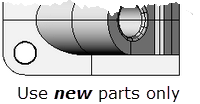
To create text
- Type the text.
- Specify the properties.
- Pick the location for the text.
To edit text
- Select the text, and in the Properties panel, click the Text button to access overrides to the style and text content settings.
Or
- Double-click the text to open the Edit Text dialog box.
Add special symbols in the scriptable command, -Text
Text containing spaces, to be entered at the Rhino command line, must be enclosed in double-quotes. In addition, some rich text characters cannot be input directly at the Rhino command line; they need to be enclosed in double-quotes or escaped using a single backslash in order to be correctly interpreted. For example:
|
Symbol |
Input |
Output |
|
' (Single quote) |
"'xyz'" |
'xyz' |
|
" (Double quote) |
""xyz"" |
"xyz" |
|
! (Exclamation mark at beginning) |
"!xyz" |
!xyz |
|
\ (Backslash) |
"\\xyz\\" |
\xyz\ |
|
\n (New line) |
x\ny\nz |
x y z |
|
{ and } (Curly brackets) |
\{xyz\} |
{xyz} |
Text
Style
The used annotation style.
Style menu
Lists the annotation styles available in the model. If an annotation has any settings in its properties different from its style, a menu behind the style name appears.
Remove overrides
Resets all the changed settings to the style defaults.
Update <Style> to match
Applies the changed settings to the annotation style.
Save as new style
Uses the settings in the properties to create a new style.
Edit Style...
Edits the Annotations style used by the selected annotation object.
Height
The text height.
Mask
Surrounds text with an opaque color.
None
Turn off mask.
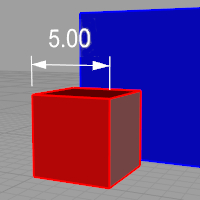
Background
Sets the mask color to the viewport background color.

Solid Color
Selects the mask color using the Select Color dialog box.
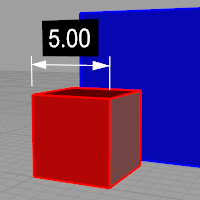
Mask Color
When Mask is set to Solid Color, click to change the color.
Mask margins
The width of the blank area around the text.
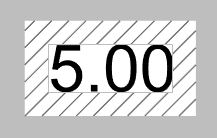
Model space scale
The display size is a product of the component's size (like arrow size or text height) and the Model space scale value.
Normally this is the inverse of the print scale. The text height, extension line extension, extension line offset distance, and arrow length are multiplied by this number.
 Draw frame around text
Draw frame around text
Displays a rectangle enclosing the text in annotations. The Mask margins setting controls the distance between the text and rectangle.

Font
The text appearance.
-
Click to open the drop-down list, and type the initial letter of a font to find the font quickly.
-
Click the font control and scroll the mouse wheel through the list to select a font.
-
If a font used by an annotation is missing on the current system:
You will be prompted when the model is opened.

Enable the "Don't show this message again" checkbox in the warning dialog box to stop detecting missing fonts.
To re-enable missing font detection, enable Rhino.Warnings.MissingFontWarning in Rhino Preferences > Advanced.
The annotation displays with a substitute font in viewports.
The missing font is listed with "(not installed)" in the font list.
 Upper case
Upper case
Changes all letters in the selected text to uppercase.
 Lower case
Lower case
Changes all letters in the selected text to lowercase.
 Capitalize words
Capitalize words
Changes the first letters of the words in the selected text to uppercase, all the other letters to lowercase.
 Invert case
Invert case
Reverts uppercase and lowercase in the selected text.
Text alignment
 Left align text
Left align text
Sets the horizontal text alignment to the left.

 Center align text
Center align text
Sets the horizontal text alignment to the center.

 Right align text
Right align text
Sets the horizontal text alignment to the right.

 Top align text
Top align text
Sets the vertical text alignment to the top.

 Middle align text
Middle align text
Sets the vertical text alignment to the middle.

 Bottom align text
Bottom align text
Sets the vertical text alignment to the bottom.

B
Sets the font style to bold.
I
Sets the font style to italic.
U
Sets the font style to underlined.
 Text Field
Text Field
Text fields are formulas that are evaluated while Rhino is running and the result is displayed in the text. All text fields are in the syntax of %<field and options>%. When a formula cannot be evaluated an error string of #### is displayed.
- If a text field displays a long text string, such as a long file path, you can turn on control points of the text and move the right text point to wrap the text string.

- Text fields support basic arithmetic operations.

To double an area, add *2 behind the close parenthesis as:
%<Area("d90815b8...80c59a")*2>%
To multiply two text fields, use:
%<CurveLength("07c73fde...8a5c7b")*CurveLength("296ed593...0472e0")>%
 Toggle stacking brackets
Toggle stacking brackets
The toggle stacking brackets button is a shortcut to add or remove [[...]] around text selected in the edit box. Stacking brackets will make the text between them stack, so that [[1/2]] will display as a stacked fraction.
 Degree
Degree
Enters a degree symbol (°) into the text.
 Radius
Radius
Enters a radius symbol (R) into the text.
 Diameter
Diameter
Enters a diameter symbol (Ø) into the text.
 Plus/Minus
Plus/Minus
Enters a plus/minus symbol (±) into the text.
 Exponent 2
Exponent 2
Enters a superscript 2 (²) into the text.
 Exponent 3
Exponent 3
Enters a superscript 3 (³) into the text.
Edit box
The text displays in the text object.
Font size of the edit box can be controlled by command prompt options.
Edits the Annotations style used by the selected annotation object.
Selects an annotation to apply its properties to the current text.
Unit - Format
The unit and format of the annotation style.
Only for the text created by DimArea or DimCurveLenth, or contains a Text Field of Area, CurveLength, or Volume.
 Horizontal to view
Horizontal to view
Text is always flat to the screen. Uncheck if you need to orient text in viewports.
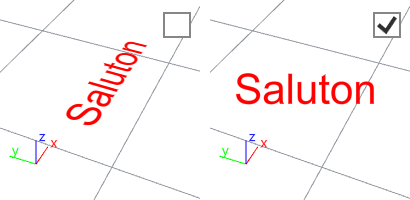
|
Toolbar |
Menu |
|---|---|
|
|
|
The RTextEdit command is run by script interface and OnDoubleClick to edit text objects.

